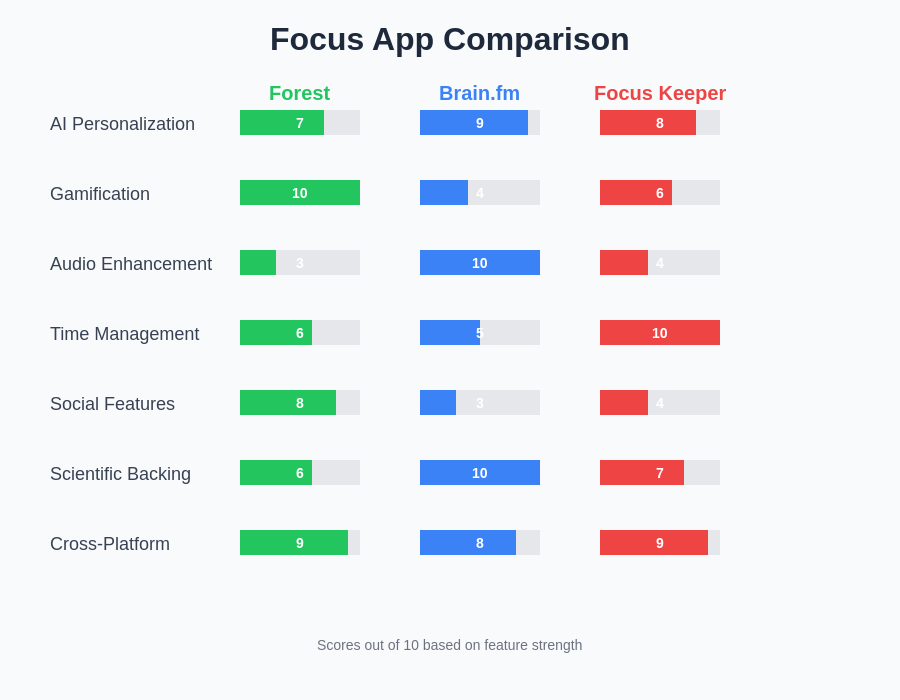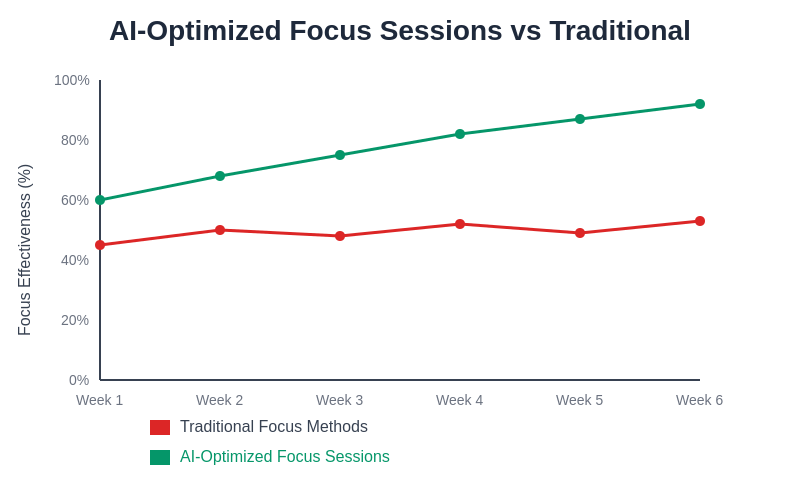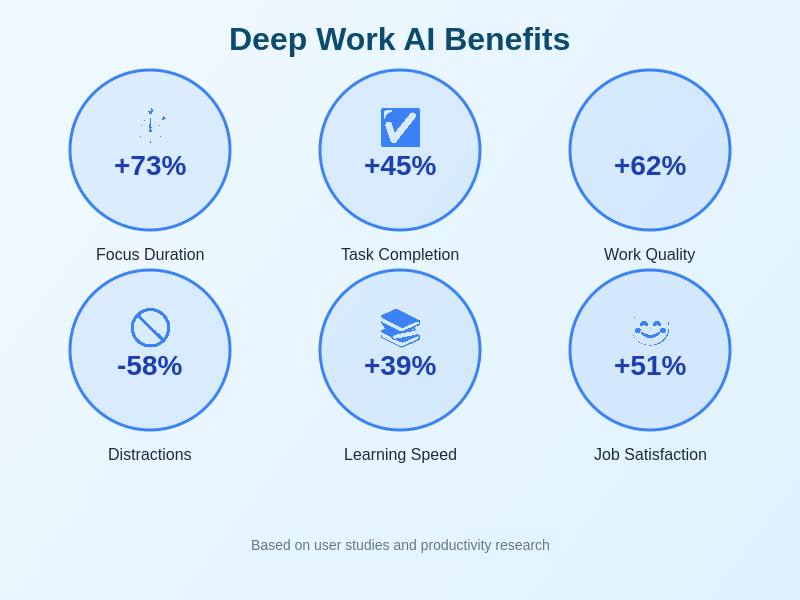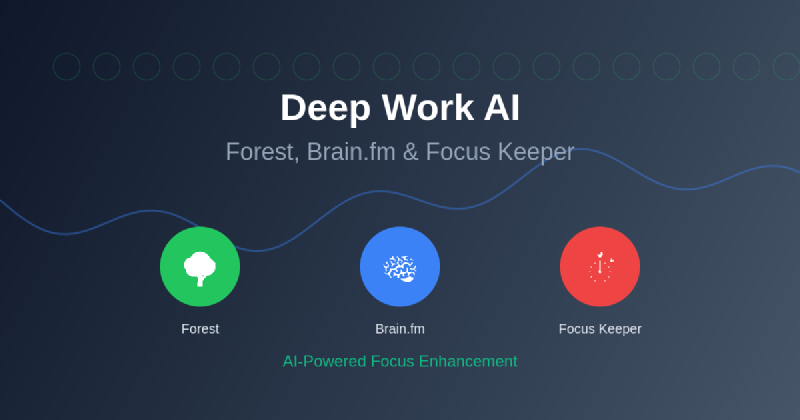The pursuit of deep work and sustained focus has become increasingly challenging in our hyperconnected digital age, where distractions lurk behind every notification and the constant pull of social media threatens to fragment our attention into increasingly shorter intervals. However, the same artificial intelligence revolution that has contributed to our distraction-rich environment is now offering sophisticated solutions through innovative applications that leverage behavioral science, machine learning, and personalized optimization to help individuals reclaim their ability to engage in meaningful, concentrated work for extended periods.
Explore the latest AI productivity trends to discover cutting-edge tools and techniques that are transforming how we approach focus and concentration in the modern workplace. The convergence of artificial intelligence with productivity science has created a new category of applications that go beyond simple timers and blockers, instead offering intelligent systems that learn from user behavior, adapt to individual preferences, and provide scientifically-backed interventions to enhance cognitive performance and sustained attention.
The Science Behind AI-Enhanced Focus Applications
The foundation of modern AI-powered focus applications rests upon decades of research in cognitive psychology, neuroscience, and behavioral economics, combined with the computational power to analyze patterns in human attention and productivity. These applications represent a significant evolution from traditional productivity tools by incorporating machine learning algorithms that can identify optimal work patterns, predict when users are most likely to become distracted, and provide personalized interventions designed to maintain sustained focus throughout extended work sessions.
The integration of artificial intelligence into focus applications has enabled the development of sophisticated systems that can analyze vast amounts of user data to identify subtle patterns in productivity cycles, attention spans, and environmental factors that contribute to or detract from deep work sessions. This data-driven approach allows these applications to provide increasingly personalized recommendations and interventions that are tailored to individual users’ unique cognitive patterns and work styles, rather than relying on one-size-fits-all approaches that may not be effective for all users.
Forest: Gamification Meets Environmental Consciousness
Forest represents a pioneering approach to focus enhancement that combines behavioral psychology with environmental awareness through an ingenious gamification system that transforms the abstract concept of sustained attention into a tangible, visual representation of growth and achievement. The application operates on the simple yet powerful premise that users plant virtual trees that grow only when they maintain focus on their chosen tasks, creating a direct correlation between concentrated effort and environmental symbolism that resonates with users on both practical and emotional levels.
The artificial intelligence components within Forest analyze user behavior patterns to optimize tree growth algorithms, adjust difficulty levels based on individual performance, and provide personalized recommendations for focus session durations that align with each user’s demonstrated attention capacity. The application’s machine learning systems continuously refine their understanding of what motivates individual users, whether through visual rewards, social accountability features, or the satisfaction of contributing to real-world tree planting initiatives through the application’s partnership with environmental organizations.
Enhance your productivity with advanced AI assistants like Claude to complement your deep work sessions with intelligent research capabilities and comprehensive task management support. The synergy between focus applications and AI-powered productivity tools creates a comprehensive ecosystem for managing both the attentional and cognitive aspects of complex work projects, enabling users to maintain sustained focus while having access to intelligent assistance when needed.
The social elements of Forest leverage network effects and peer accountability to create additional motivation for maintaining focus, as users can join virtual focus rooms with friends or colleagues, participate in challenges that promote collective productivity, and share their achievements within communities of like-minded individuals who are also working to improve their attention spans and work quality. This social dimension adds a layer of external accountability that many users find essential for maintaining consistency in their deep work practices, particularly when working remotely or in environments with limited natural accountability structures.
Brain.fm: Neuroscience-Driven Audio Enhancement
Brain.fm represents a sophisticated application of neuroscience research and artificial intelligence to the challenge of optimizing cognitive states through precisely engineered audio experiences that are designed to enhance specific mental functions including focus, creativity, relaxation, and sleep. The platform distinguishes itself from traditional ambient music or white noise applications by utilizing patented technology that incorporates neural oscillations, binaural beats, and other psychoacoustic principles that have been validated through peer-reviewed research and clinical studies.
The artificial intelligence systems within Brain.fm continuously analyze user feedback, biometric data where available, and behavioral patterns to optimize audio delivery and personalize listening experiences for maximum cognitive enhancement. The platform’s machine learning algorithms can identify which specific audio characteristics are most effective for individual users across different types of cognitive tasks, allowing for highly personalized audio prescriptions that evolve based on user response and performance data over extended periods of use.
The scientific foundation of Brain.fm rests upon extensive research into how specific audio frequencies and patterns can influence brainwave activity and cognitive performance, with the platform incorporating findings from neuroscience research into entrainment, attention networks, and the relationship between auditory stimuli and mental states. This evidence-based approach ensures that the audio experiences provided by the platform are not merely pleasant background sounds, but rather carefully crafted interventions designed to produce measurable improvements in cognitive function and sustained attention capacity.
The personalization capabilities of Brain.fm extend beyond simple preference matching to include sophisticated analysis of how individual users respond to different types of audio stimuli across various contexts, including time of day, task complexity, environmental factors, and even mood states. This comprehensive personalization ensures that users receive audio experiences that are optimized not just for general focus enhancement, but specifically calibrated to support their unique cognitive patterns and work requirements at any given moment.
Focus Keeper: The Pomodoro Technique Enhanced by Intelligence
Focus Keeper represents an intelligent evolution of the time-tested Pomodoro Technique, incorporating artificial intelligence and machine learning to optimize work-rest cycles based on individual performance data and behavioral patterns rather than relying solely on the traditional fixed intervals that may not align with every user’s natural attention rhythms. The application maintains the fundamental structure of alternating focused work sessions with brief breaks, but enhances this framework with adaptive algorithms that can adjust session lengths, break durations, and transition timing based on user performance and engagement metrics.
The AI components within Focus Keeper analyze patterns in user productivity across different session lengths, break activities, and environmental conditions to provide personalized recommendations for optimal work-rest ratios that maximize both productivity and sustainability. The application’s machine learning systems can identify when users are experiencing attention fatigue, predict optimal times for longer breaks, and suggest modifications to work patterns that can improve overall focus quality and reduce the cognitive burden associated with extended periods of concentrated effort.
Discover comprehensive research capabilities with Perplexity to support your deep work sessions with intelligent information gathering and analysis that complements focused work periods. The integration of AI-powered research tools with focus management applications creates a powerful combination for knowledge workers who need to balance sustained concentration with access to relevant information and insights.
The adaptive nature of Focus Keeper’s AI systems allows the application to recognize when traditional Pomodoro intervals may not be optimal for specific types of work or individual cognitive patterns, automatically suggesting alternative approaches such as longer focus sessions for creative work, shorter intervals for complex analytical tasks, or modified break activities that better support sustained attention across different types of cognitive demands. This flexibility ensures that users can maintain the benefits of structured work-rest cycles while adapting the technique to their specific needs and work requirements.
Comparative Analysis: Strengths and Applications
Each of these AI-enhanced focus applications offers distinct advantages and is optimized for different aspects of the deep work challenge, making them complementary rather than competing solutions for individuals seeking to improve their attention management and productivity. Forest excels in providing visual motivation and social accountability features that are particularly effective for users who respond well to gamification and environmental themes, while also offering the psychological satisfaction of contributing to real-world environmental initiatives through sustained focus efforts.
Brain.fm distinguishes itself through its rigorous scientific foundation and sophisticated audio engineering that provides measurable cognitive enhancement benefits, making it particularly valuable for users who work in environments where they have control over their auditory environment and can benefit from neurologically-optimized background audio. The platform’s emphasis on evidence-based interventions and personalized audio prescriptions makes it especially suitable for users who prefer scientifically-validated approaches to productivity enhancement.
Focus Keeper offers the most comprehensive approach to time management and work-rest optimization, making it ideal for users who benefit from structured work sessions but need more flexibility and personalization than traditional Pomodoro applications provide. The application’s AI-driven adaptations to the classic technique ensure that users can maintain the benefits of systematic focus management while avoiding the rigidity that can make traditional time-blocking approaches counterproductive for certain types of work or individual preferences.
Integration Strategies for Maximum Effectiveness
The most effective approach to leveraging these AI-powered focus applications often involves strategic integration rather than exclusive reliance on any single tool, as each application addresses different aspects of the attention management challenge and can be combined to create comprehensive focus enhancement systems. Users can employ Forest for visual motivation and social accountability during collaborative work sessions, utilize Brain.fm for cognitive enhancement during individual deep work periods, and implement Focus Keeper for structured time management across different types of tasks and projects.

This comprehensive analysis reveals the unique strengths of each application across critical focus enhancement dimensions, demonstrating how Forest excels in gamification and social features, Brain.fm leads in scientific backing and audio enhancement, while Focus Keeper dominates in time management capabilities. Understanding these distinct advantages enables users to select the most appropriate tool for their specific focus challenges and work requirements.
The key to successful integration lies in understanding how each application’s strengths align with specific work contexts, personal preferences, and cognitive demands, allowing users to create personalized focus ecosystems that adapt to different situations and requirements. For example, users might employ Forest during creative brainstorming sessions where social accountability and visual progress tracking provide optimal motivation, switch to Brain.fm during analytical tasks that require sustained concentration and cognitive enhancement, and use Focus Keeper for administrative work that benefits from structured time management and regular breaks.
The artificial intelligence components within each application can learn from usage patterns across integrated systems, potentially providing insights into which combinations of tools and techniques are most effective for different types of work and personal productivity patterns. This cross-platform learning capability suggests that the future of focus enhancement may involve increasingly sophisticated AI systems that can coordinate across multiple applications to provide comprehensive attention management solutions.
Behavioral Science Integration and Habit Formation
The effectiveness of AI-powered focus applications extends beyond their immediate cognitive enhancement capabilities to include their role in facilitating long-term habit formation and behavioral change that supports sustained improvements in attention management and work quality. These applications leverage principles from behavioral psychology, including variable reward schedules, progressive goal setting, and social reinforcement mechanisms, to create sustainable patterns of focus and productivity that persist even when the applications are not actively being used.
The machine learning systems within these applications can identify optimal intervention timing, reward frequency, and challenge progression that support habit formation while avoiding the psychological reactance that can occur when productivity systems become overly restrictive or demanding. This sophisticated understanding of behavioral psychology enables the applications to provide support that feels natural and sustainable rather than forced or artificial, increasing the likelihood that users will maintain their focus practices over extended periods.
The integration of AI into habit formation processes allows these applications to provide personalized behavior modification strategies that are tailored to individual psychological profiles, motivation patterns, and learning styles. This personalization ensures that the habit formation process aligns with each user’s unique behavioral tendencies and preferences, increasing the effectiveness of the intervention and reducing the likelihood of abandonment or resistance that can occur with one-size-fits-all approaches to behavior change.

The dramatic improvement trajectory shown by AI-optimized focus sessions demonstrates the compound benefits of intelligent personalization and adaptive learning algorithms. While traditional focus methods plateau quickly, AI-enhanced approaches continue to improve performance over time, ultimately achieving nearly double the effectiveness through continuous optimization and personalized interventions.
Privacy and Data Security Considerations
The sophisticated AI capabilities of modern focus applications necessarily involve the collection and analysis of detailed behavioral data, including work patterns, attention spans, productivity metrics, and potentially sensitive information about work habits and professional activities. Users must carefully consider the privacy implications of sharing this information with application providers and ensure that they understand how their data is being used, stored, and potentially shared with third parties.
The most reputable focus applications implement robust data protection measures including end-to-end encryption, local data processing where possible, and transparent privacy policies that clearly explain data usage and retention practices. Users should prioritize applications that provide granular privacy controls, allow for data export and deletion, and demonstrate commitment to protecting user privacy through third-party security audits and compliance with relevant data protection regulations.
The balance between personalization effectiveness and privacy protection represents an ongoing challenge in the development of AI-powered productivity tools, as more sophisticated personalization typically requires more extensive data collection and analysis. Users must weigh the benefits of highly personalized focus enhancement against their comfort level with data sharing and make informed decisions about which applications and features align with their privacy preferences and professional requirements.
Future Developments and Emerging Technologies
The future of AI-powered focus applications promises even more sophisticated integration of emerging technologies including biometric monitoring, environmental sensors, calendar integration, and cross-platform synchronization that will enable more comprehensive and intelligent attention management systems. These developments may include real-time physiological monitoring that can detect attention states and provide immediate interventions, integration with smart home systems that can optimize environmental conditions for focus, and coordination with professional productivity tools that can align focus sessions with work priorities and deadlines.
The evolution of machine learning algorithms and natural language processing may enable focus applications to provide more sophisticated coaching and guidance, potentially including personalized productivity advice, work pattern analysis, and recommendations for optimizing both individual focus sessions and broader productivity systems. These advanced capabilities could transform focus applications from simple tools into comprehensive productivity coaching systems that provide ongoing support for professional development and performance optimization.
The integration of virtual and augmented reality technologies may create new possibilities for immersive focus environments that can provide unprecedented levels of distraction reduction and cognitive enhancement through carefully designed virtual workspaces that are optimized for specific types of cognitive tasks. These immersive technologies could address one of the fundamental challenges of remote work and flexible work environments by providing consistent, optimized focus environments regardless of physical location or external distractions.
The continued advancement of AI-powered focus applications represents a significant opportunity for individuals and organizations seeking to improve productivity, work quality, and professional satisfaction through enhanced attention management and sustained focus capabilities. The combination of scientific research, artificial intelligence, and user-centered design creates powerful tools that can help individuals reclaim their ability to engage in deep, meaningful work despite the increasing distractions and fragmentation of modern digital environments.

The quantifiable benefits of implementing AI-powered deep work tools extend across multiple dimensions of professional performance and personal well-being. These improvements compound over time, creating substantial increases in overall productivity, work satisfaction, and cognitive capacity that justify the investment in sophisticated focus enhancement technologies.
Disclaimer
This article is for informational purposes only and does not constitute professional advice regarding productivity tools or cognitive enhancement techniques. The effectiveness of focus applications may vary based on individual needs, work environments, and personal preferences. Readers should evaluate their specific requirements and consider consulting with productivity professionals or cognitive specialists when implementing significant changes to their work practices. The information provided is based on currently available research and application features, which may evolve over time.
